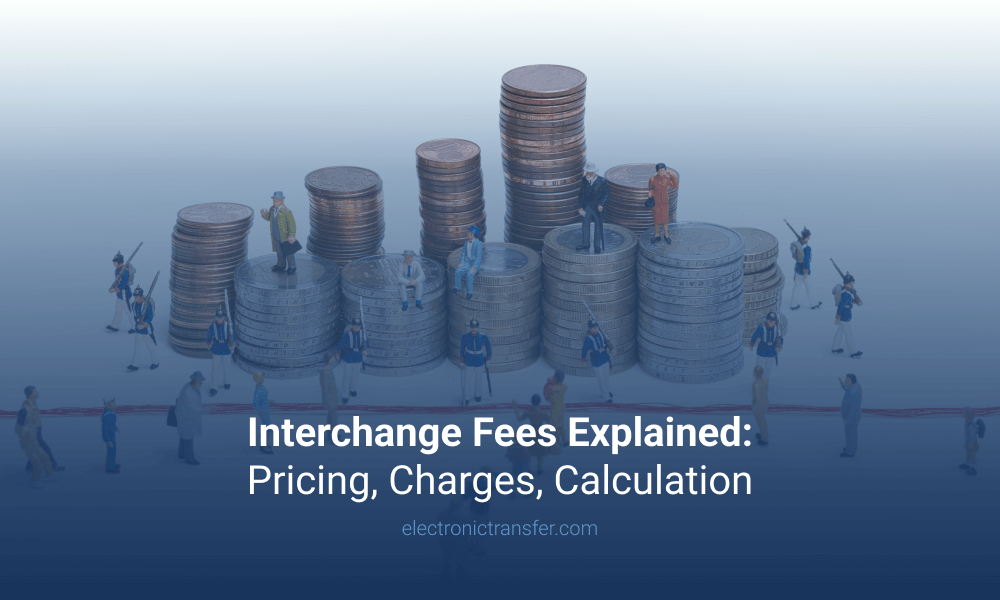Interchange Fees Explained: Pricing, Charges, Calculation

Credit and debit card payments are not just an optional method of payment, they are a necessity, especially if you want to improve the customer payment experience.
However, providing such payment options to your customers means you need to pay interchange fees.
What’s also important is that you understand these fees and how they can impact your pricing strategies and overall business profit.
Interchange Fees Explained: What Are They?
Every time a customer uses a credit or debit card to make a purchase, the merchant must pay a transaction fee (interchange fee) to the bank that issued the card.
As David Robertson, Publisher of The Nilson Report, puts it:
“Interchange fees represent the largest component of the costs associated with processing card payments, and understanding them is crucial for any business looking to optimize its payment acceptance strategy.”
Interchange fees play an important role in payment processing, since through them, banks can get compensated for any risks and costs associated with card transactions. These fees make up around 70-90% of the total fees merchants pay for card processing.
How Do Interchange Fees Work?
Now that we know what interchange fees are, let’s take a look at how they work:
- The cardholder pays for a product/service.
- The vendor submits the transaction to the bank.
- The transaction is then routed through a card network to the bank that issued the card.
- The issuing bank authorizes the transaction and applies an interchange fee.
- The interchange fee is deducted, and the funds are transferred from the issuing bank to the acquiring bank, and finally to the account of the merchant.
How Are Interchange Fees Calculated?
The way interchange fees are calculated, depends on a number of factors.
Types of Cards
Credit cards, for instance, usually have a higher associated cost, due to credit risk and rewards programs.
Debit cards, on the other hand, have lower fees, because they draw funds directly from the cardholder’s bank account, which reduces credit risk.
And premium cards with rewards programs also typically have more expensive fees, because of the additional benefits they provide.
Transaction Type
In-store transactions where the card is physically inserted or swiped into the reader have lower fees, since they are less susceptible to fraud.
Alternatively, online or phone payments have greater transaction fees, due to the higher probability of fraudulent transactions.
Merchant Category Code (MCC)
Interchange fees vary according to the industry and its risk profile. For example, grocery stores will usually have lower fees compared to travel agencies due to lower fraud risk and transaction volumes.
Volume and Size of Transactions
Merchants with high-volume transactions could negotiate lower interchange rates due to the volume of their transaction. What is more, larger transactions might attract different fee structures compared to smaller transactions.
Location
Another factor that may increase the fees is the geographical location of the business (country or region). This depends on the local regulations and market conditions.
For instance, the European Union has capped interchange fees at 0.2% for debit cards and 0.3% for credit cards. In the United States, the Durbin Amendment has limited debit card interchange fees for larger banks, typically capping them at 0.05% + $0.22 per transaction.
In Australia, interchange fees for credit cards are capped at 0.8%, with further restrictions on debit card transactions, and so on.
Payment Networks
Different card networks (Visa, Mastercard, American Express, Discover, etc.) have separate interchange fee structures and rates.
Here’s a quick example:
| Card Network | Card Type | Transaction | Interchange Rate |
| Visa | Credit | In-Store | 1.51% + $0.10 |
| Visa | Debit | Online | 1.80% + $0.15 |
| MasterCard | Credit | In-Store | 1.55% + $0.10 |
| MasterCard | Debit | Online | 1.60% + $0.15 |
So, let’s say you make an online purchase worth $200 with your MasterCard debit card. The interchange rate is 1.60% + $0.15.
(200×0.0160)+0.15=3.20+0.15=$3.35, so the interchange fee is $3.35.
Other Factors
Additional factors can also influence your interchange fee, including the currency of the transaction, specific merchant agreement terms, and recurring billing.
What Are the Future Trends in Interchange Fees?
As technology keeps evolving, new payment methods, such as digital wallets and mobile payments, will grow in popularity. This, of course, means that interchange fees will also have to evolve.
Crypto payments, for instance, may greatly reduce the reliance on interchange fees, disrupting traditional payment systems.
Additionally, the rise of contactless and digital payments, will most likely require that interchange fees to be adjusted as well, so that they accommodate new transaction types and volumes.
Last but not least, existing caps worldwide may have to be revised, affecting the calculation and application of interchange fees, especially in regions with more restrictive regulations.
As Jim McCarthy, former Executive Vice President of Innovation and Strategic Partnerships at Visa, states:
“As the payments landscape evolves, interchange fees will continue to adapt, reflecting changes in technology, consumer behavior, and regulatory environments. Collaboration between stakeholders is key to ensuring a fair and efficient system.”
What Can Electronic Transfer Do for You?
As one of the most trusted and reputable credit card processing providers, Electronic Transfer can significantly boost your business sales by offering user-friendly and efficient payment solutions.
We support multiple payment methods, including credit and debit card transactions, and our services are designed to handle interchange fees effectively, providing merchants with competitive rates and transparent fee structures.
With the help of our expertise, your business can enjoy the benefits of optimized payment processing. Our top of the line customer service and advanced security will ensure that you are always running smoothly, and earning the trust of your customers.
Give us a call today (800-757-5453), and you can join the list of over 50,000 merchants we’ve already helped.


